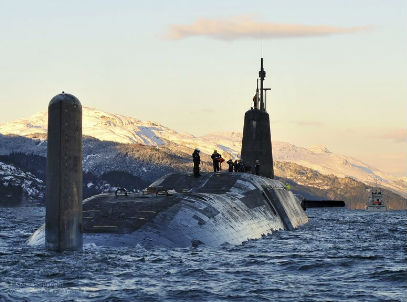
The pro-nuclear alliance that has dominated Britain’s major political parties for decades showed further signs of disintegration last week when ConservativeHome hosted an intelligent and well-researched blog in support of the CentreForum think tank’s new ‘Dropping the Bomb’ report. The report argues that Trident is now a waste of money and that the billions should be spent instead on conventional military forces, while maintaining Britain’s technical “nuclear capability”.
This is scarcely a conversion to CND – but it does pose again some questions which supporters of Trident have never really answered.
Is it really the “minimum deterrent”, as it is regularly described, to have Trident submarines on routine 24-hour patrol? And if supporters of Trident concede, as the Coalition Government did in its National Security Strategy, that there is no short or medium term threat that justifies a ‘nuclear deterrent’, why not support CentreForum’s more credible minimal ‘deterrent’: diverting the money for Trident replacement to conventional weaponry, whilst maintaining the ability to regenerate a nuclear capability in 12-18 months?
The reason these questions are not answered is that support for nuclear weapons is based on posture and vanity not a rigorous assessment of Britain’s defence needs (and within Labour’s ranks, a misguided electoral anxiety). The framework for CentreForum’s report and the related argument made on ConservativeHome is pro-military and retains a theoretical nuclear capability. That will surprise no-one on the left. But – along with former Foreign Secretary Malcolm Rifkind co-chairing the Trident Commission and former Conservative Party Chairman Michael Ancram voting against Trident Replacement in the last parliamentary vote – it does show those far more favourable to the military moving well beyond the grand gestural rhetoric of the 1980s that has intimidated a succession of Labour leaders.
With a recognition across the political spectrum that circumstances have changed, the Labour Party should no longer have any anxiety reviewing its position, and Ed Miliband’s recent comments indicating an open mind are welcome. The CentreForum report is correct to say “let’s make informed forward looking choices”. The Labour Party cannot afford to base its nuclear policy on a flawed analysis of the reasons for its defeat in 1983 and 1987, when Ed Miliband didn’t have a vote and the 18-24 age group weren’t even born.
Obama – now likely to be re-elected in November – has spoken of his vision of a world without nuclear weapons. To achieve that vision, Ban Ki-Moon and over 140 countries now support a Nuclear Weapons Convention as the means to achieve global abolition of nuclear weapons. The next Labour manifesto should commit to the Convention, rather than being sidetracked by the false adoption of the language of multilaterism to justify a misnamed ‘minimum deterrent’.
The next Labour Government should show its good faith in negotiations leading to worldwide nuclear disarmament: by taking Trident off routine patrol, scrapping plans to replace to it and working swiftly towards a nuclear free Britain and a nuclear free world.
- By Daniel Blaney

